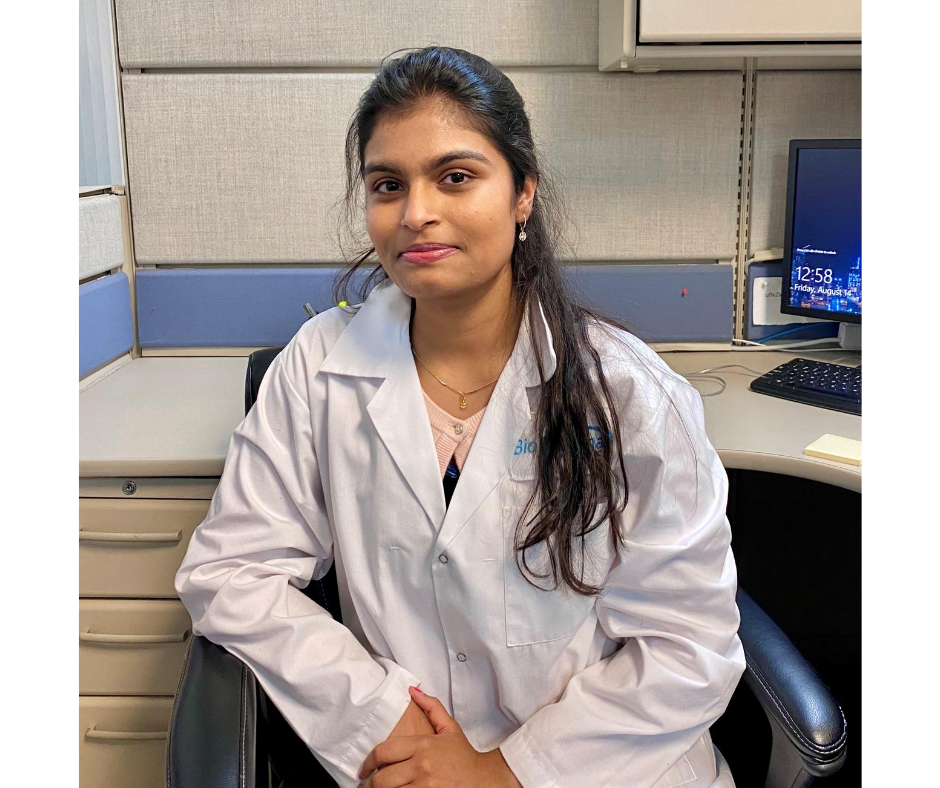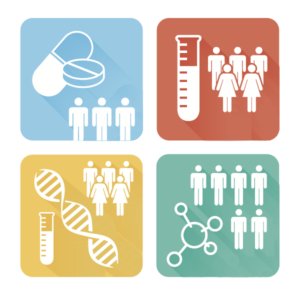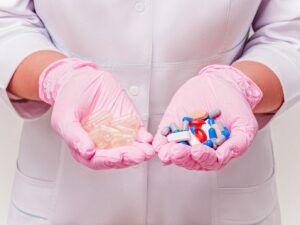A Dream Realised – A Conversation with Senkaya Senkaiahliyan

Since elementary school, Senkaya Senkaiahliyan has known that she wanted to pursue a career in clinical research. It was this interest that led her to complete a degree in Life Sciences with a specialization in Human Biology at the University of Toronto. Having completed various internships during her undergraduate studies, Senkaya turned to LinkedIn following graduation to decide how she might put her knowledge to use. A position at BioPharma Services beckoned and Senkaya joined the team as a Clinical Research Recruiter (CRR) in March 2019.
We met on a balmy Toronto afternoon to talk about Senkaya’s career so far and her future aspirations.
Tell us why you decided to apply for a position with a Contract Research Organization (CRO).
After completing my studies, I spent some time looking at my friends’ profiles on LinkedIn. Many of them work in clinical research and they suggested that a role as a Recruiter is the best opportunity to get a foot in the door with a CRO.
Working as a Recruiter really helped me to understand what clinical research is all about. It was great exposure to the clinical research process, as you are the first contact the volunteer has with the organization. We conduct telephone eligibility screening of potential volunteers, book appointments for onsite screening and assign volunteers to studies based on the results of medical screening visits.
I had spent a year learning the role when I happened to see an ad for the Clinical Research Coordinator Associate (CRCA) position at BioPharma Services. The job description sounded really interesting as it would allow me to explore the next steps in the clinical research process and I knew that I had the knowledge, skills and ability to perform my duties. I started working as a CRCA in June 2020.
What’s a typical day in the life of a CRCA?
At the start my shift, I review the study that I’ve been assigned for that day, prepare documents for the dosing of subjects and answer any questions the clinic staff might have. I then monitor the drug administration to make sure everything is being executed as per the study protocol. It has been a lot of learning as I have to be up to speed on the Study Initiation Process and I’m in direct contact with all the subjects. That’s actually a part of the role that I really like. I enjoy interacting with the volunteers and enjoy answering their questions about procedures. I appreciate that I’m now able to see more of the clinical research process. I even get to see how Project Managers work with Sponsors, as well as the QC and QA process.
What are some of the challenges you’ve faced in either role?
Timing is always crucial. Whether it’s making sure that we panel a study as a Recruiter or that dosing time points are adhered to in order to avoid deviations, timing is key. We are always aiming to avoid having any issues which could have an impact on the study and sponsors. Getting documents prepared on time is sometimes challenging as well.
Occasionally, working directly with the subjects can be challenging too. But I’ve found that if you’re able to address their concerns in a calm, direct way, most people are reasonable. I do have to be firm and to the point at times but that’s just part of the job.
It’s often noted that girls’ interest in STEM is not nurtured. Did you ever encounter this?
On the contrary, I was always encouraged to follow this career path even when I was in elementary school. I really wanted to get into sciences as I believe that there’s always something new to learn. You can never be done gaining knowledge about science when there are so many diverse areas whether it’s related to biology, chemistry or physics – it’s such a huge field! It really is a case of lifetime learning.
What do you like about working at BioPharma Services?
I’m grateful that BioPharma has given me the opportunity to learn and advance. I really like the small community feel at the company and that there are personal connections. Everyone is so friendly. For example, I know and talk to the CEO (he’s always smiling!) and it’s not unusual for the CFO to spend time with the team in the lunchroom sharing his experiences of life. It makes you aspire to be like them.
What are your interests outside of work?
I enjoy spending time with my family and I practice yoga every day. I find that it helps to release tension and connects me to the world and nature. It helps keep me sane!
How do you see yourself growing further with BioPharma?
Well right now, I’m still in training as a CRCA. I’d like to become a CRC (Clinical Research Coordinator) and I could see myself being a CRSM (Clinical Research Study Manager) some day.
Senkaya Senkaiahliyan was in conversation with Carol Estwick, Marketing Manager, BioPharma Services Inc.
About BioPharma Services Inc.
BioPharma Services Inc. is a contract research organization that conducts research studies across all medical disciplines. Our offices and study sites are located in Toronto, Ontario and St. Louis, Missouri. For our current research studies visit our Volunteer Hub today.
Popular Posts
-
What are early phase clinical trials?
Clinical Trials are divided into 4 phases. Phase 1 and 2 trials constitute early phase trials, Phase 3 and 4 research studies are late-phase trials.
The primary objective of Phase 1 studies is to determine the correct drug dosage by evaluating drug safety and determining if there are any side effects. Phase 1 trials are conducted in healthy volunteers.
Phase 2 studies also study the safety of a drug but focus on evaluating its effectiveness. These studies can be conducted in healthy volunteers or in individuals who have a certain disease or condition.
-
What is a clinical trial?
A Clinical trial is a process which is performed to determine whether an investigational drug, device or therapy is safe and effective. In early phase research (i.e. Phases 1 and 2), the safety and effectiveness of the drug will be evaluated in healthy volunteers.
-
What is an investigational drug?
An investigational drug can also be called an experimental drug and is being studied to see if your disease or medical condition improves while taking it. Scientists are trying to prove in clinical trials:
- If the drug is safe and effective.
- How the drug might be used in that disease.
- How much of the drug is needed.
- Information about the potential benefits and risks of taking the drug.
-
Why do you need to take blood draws and how many blood draws will be required?
In order to evaluate the drug profile, we need to understand its pharmacokinetics. This is essentially how the body reacts to a drug after its administration through the mechanisms of absorption, distribution, as well as the metabolic changes. Therefore, blood draws are collected at various time points to better understand this mechanism. Each study requires a specific number of blood draws and total blood volume. These values will be provided to you and clearly stipulated in the informed consent form (ICF). The amount of blood that will be taken is outlined in the ICF.
-
Should I expect to experience any side-effects while doing studies?
As every study is testing an investigational product, there may be side effects. You will be provided with a list of side effects that have been reported in previous trials (if any), so you can make an informed decision whether or not to participate in the trial. During the trial you will be required to immediately inform clinic study staff of any adverse effects that you are experiencing. These side effects usually resolve upon discontinuation of the study drug.
-
Will I be compensated for doing a clinical study?
Volunteers are compensated and the amount varies depending on the length of the clinical trial, length of stay and number of follow-up visits. The compensation is not specifically related to the risks or type of drug involved in the trials or studies. Every study is different and therefore, the compensation will vary. Study volunteers may receive between $1000 to $4000 for a trial (based on the factors listed above).
-
Are food and accommodation provided over the course of the trial?
Food – Clinical trials are conducted in a controlled setting which means that all food is provided and trial volunteers receive standardised meals. Individual meal plans or meal preferences cannot be provided. If you have any food allergies or hypersensitivity to food product(s) that are clinically significant or life-threatening you may not be able to participate in a trial. Please contact us to discuss any food issues.
Accommodation – During your in-clinic stay you will share sleeping areas with other volunteers who are of the same gender. Similar to a hospital setting, supervision will be provided to ensure that your health and safety are being monitored.
-
What is the length of a study and do I have to complete all the visits?
Details of the duration of a study can be found on the Volunteer Hub.
-
What is informed consent and how is it carried out?
Before you decide whether or not to take part in a clinical research study, you will be required to read and understand the information provided in an Informed Consent Form (ICF). The ICF describes the clinical research study and the nature of the investigational product to be used, including:
- Your rights and responsibilities as a study participant.
- What you will be asked to do during study participation.
- The potential risks that you should be aware of.
During this process, you will have the opportunity to discuss and ask questions related to the conduct of the clinical research study with the study doctor/ study staff. You are under no obligation to participate and your decision to take part in a clinical trial is voluntary.
-
Can I bring my own device?
Yes, we encourage you to bring items that will help to pass the time while you are in the clinic. You can use the time to study or work or catch up on the movies you’ve been meaning to watch.
-
What do I need to pack?
Wondering what to pack before your site visit? Visit our Packing List page to learn more.
-
When do I receive compensation for taking part in a study?
You will receive compensation as outlined during the Informed Consent process. Typically, you will receive compensation once all study visits have been completed. If, for any reason, you do not complete all study visits, your compensation will be on a pro-rated basis (i.e. for the time that you have participated in the trial)
-
Where will I sleep during the clinical study?
We provide a clean, safe socially distance sleeping environment, in a dormitory of hotel room style. Watch video
-
Can I bring my own food?
All aspects of clinical trials are closely monitored including the food and drink consumed by participants. While you are in the clinic, you will be provided with all meals as per the study guidelines. You will need to eat all the food provided to ensure the guidelines are met. Watch video
-
Privacy
We respect and value the privacy of our volunteers. View our Privacy and Cookie Policy here.



